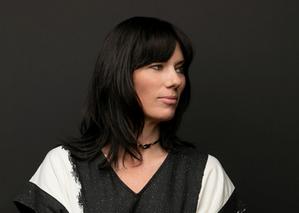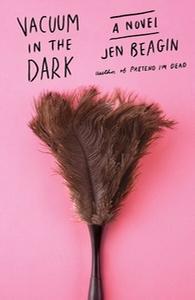
|
|
| photo: Beowulf Sheehan | |
Jen Beagin is the author of Pretend I'm Dead and the forthcoming Vacuum in the Dark (Scribner, $25; reviewed below). Both novels center on Mona, a cleaning lady in the process of finding herself. Beagin received an MFA in creative writing from the University of California, Irvine, and received the 2017 Whiting Award in Fiction. She lives in Hudson, N.Y.
You previously worked as a cleaner. What was it like to see the insides of so many other people's homes, offices, spaces?
I cleaned houses off and on for about seven years, first in Santa Cruz, then San Francisco and finally in Taos. It can be a strange business. There's nothing else quite like it in the service industry. You're alone in someone's house for hours at a time on a regular basis and you're cleaning deeply, moving things around. You're cleaning under the bed. You're going over every surface. You've seen their pubes, their pictures, their medicine, their receipts. You know what they eat, read, drink, look at. You know how much money they spend on things they don't need. You eventually find that thing they're hiding. You don't have to open drawers, believe me. If you clean someone's house long enough, these things reveal themselves. You can tell how happy or miserable someone is. You can see it in the quality of the dirt. A deeply despairing person's dirt has a particular stickiness and an odor I've never been able to accurately describe. But people have lots of layers.
I think I would have had a different experience had I not been a white, native English speaker who wore cool sneakers, drove a cool car and had read the same books. My clients invited me to their parties, weddings, seminars. They took me out for sushi. They urged me to join their cults. They fought in front of me. Cried. Told me their stories. Walked around in their pajamas.
You said in a previous interview that you see yourself in your character, Mona. Do you think you and Mona have grown differently between your two novels? Do you still see yourself in her?
The thing is, I'm pushing 50. That makes Mona half my age. So we've absolutely grown differently between the two novels. She has only aged two years, whereas I've aged 10, and, boy, has it been a long decade. I left my boyfriend of 11 years for a woman I met at a dog park, for instance. I moved seven times, lived in four different states, plus Europe briefly, almost killed myself in Florida, etc. I would say I've grown more than Mona because I take more personal risks than she does. The main difference between us is that she's a lot lonelier. I haven't given her many friends, and the poor girl's been through the ringer. But so have I. She is definitely a version of me--we share many, many of the same qualities and have similar histories.
 We come to know Mona quite well in the novel, but not her house so much. What is her house like?
We come to know Mona quite well in the novel, but not her house so much. What is her house like?
You know, I wish I'd spent more time in Mona's house in this novel. I think that would've been wise. It wasn't a conscious decision, but I think it says a lot about Mona, right? Her over-involvement in the lives of others, the fact that she doesn't know where she belongs, etc.
But I would say Mona's house is carefully decorated. She suffers from rearrange-itis. She will hang a painting, for example, and then rehang it over and over until it feels right. She moves her rugs three inches to the left, five inches to the right, etc. Her place is clean and free of clutter. Most of her stuff is used and had a whole other life before it came into hers. She's often very attached to objects that have belonged to others, objects that have had some prior history, and she collects things like airline barf bags, bird figurines, books.
You mentioned that you'll likely write a third Mona book. When you are working on a new piece, what is your writing process like?
In terms of my writing process, the hours between 4 and 7 a.m. are my best, before I've had coffee, which actually puts me to sleep, weirdly, and during these hours I write in bed, on my phone. I usually encounter some problem in the writing by seven, and will take a short nap. Naps seem to be part of my process. Then I continue writing and/or editing until noon, still in bed, but with my laptop, after which I usually call it quits. Afternoons and evenings have never been good for me, because my inner critic is wide awake and berating me.
I'll make a very rough outline after I've written 40 or so pages, an outline I usually abandon. I'm not big on plot, as you may have noticed. I've always envied writers who outline. It's probably a very useful tool. But it's something I've never learned how to do properly. I often write sentence to sentence, and I tend to live that way, too.
I don't want to say much about the third Mona book because I haven't started it yet. Right now, I'm working on something set in this house I'm living in. It's an ancient Dutch farmhouse built in 1737. I'm living in what's supposed to be the living room, which I keep heated with a wood stove. I have the setting and a few of the characters, and I've written some scenes. Nothing is mapped out, but I'm comfortable being lost for now. --Kerry McHugh, blogger at Entomology of a Bookworm

